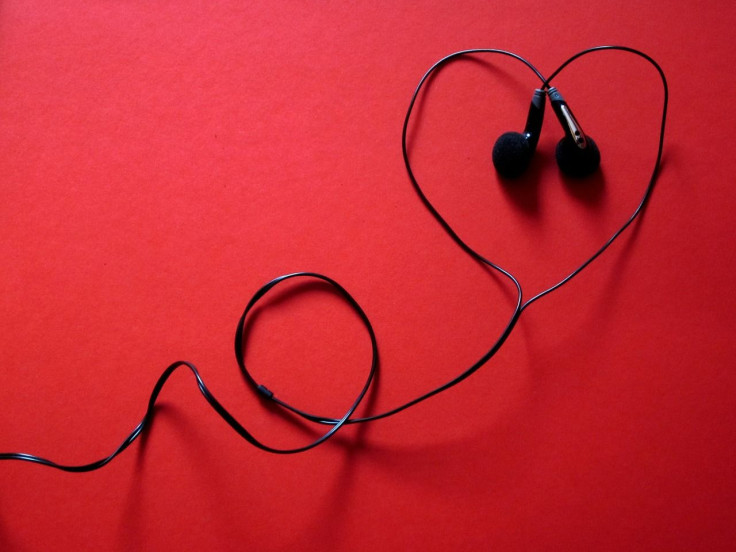Breakup Songs: Knowing When To Play Sad And Happy Music Can Help The Healing Process

Following a breakup, many people seethe with desire to listen to music that will help them process the new void in their life. For some, this music reflects the intensity of their pain, as if they're able to release their emotional strife through the lyrics of the artist. For others, the songs are uplifting, beckoning a new day and a new mindset. While it makes sense that some people would gravitate to music for relief, are some songs better than others when it comes to moving forward?
In Favor Of Sad Songs
It may seem like people who listen to sad songs after a breakup are only wallowing in their despair, but according to musicologist Kay Norton, grieving with music helps us get rid of sad emotions. In part, she says, it's because "music has the same shape, the same ebb and flow as human emotions." This kind of music can push the grieving person to "weep, or grieve in another way that's appropriate to them." Cut to everyone who's ever listened to Adele.
Getting that grief out is the most important step. If nothing else, Psychology Today reported holding in sadness is unhealthy and often exacerbates negative feelings. Denying or suppressing these feelings can elongate suffering and increase distress, because refusing to encounter grief allows these emotions to fester and grow until they resurface stronger than ever.
Sad songs intensify your feelings when you're in mourning, but it ultimately moves up the expiration date on the debilitating pain associated with a breakup —broken heart syndrome is real. Songs like Bonnie Raitt's "I Can't Make You Love Me" can help listeners come to terms with their feelings, saying aloud "what [their] hearts need to hear," Norton told Medical Daily.
"Listening to sad music can[…]be affirming because music is, in some ways, more concrete than feelings are. We can play a recording multiple times and, importantly, it has a beginning, middle, and end," she said. "In this way, we might actually 'plan' a grieving session if we're feeling too much sadness is bottled up inside. Our emotions often swell and diminish as music moves toward its end."
In addition to offering a timed grieving session, the music itself is beneficial to broken-hearted listeners. For example, a 2014 study found listening to melancholic music after a breakup rewarded the imagination, incited empathy, and provided emotional relief due to the lack of "real-life implications." In other words, people experienced pleasure from being able to connect with the lyrics and let their imaginations "run with the spontaneity of the melody." They were also able to empathize with the musician, which made them feel like they weren't alone in being sad.
A separate study published in the Journal of Consumer Research in 2013 suggested this empathy goes both ways, as if the music is a friend sympathizing with your heartbreak. It's like crying on a friend's shoulder as they say, "It's OK to feel hurt," and, "You're not alone."
"Emotional experiences of aesthetic products are important to our happiness and wellbeing," according to the 2013 study authors. "Music, movies, paintings, or novels that are compatible with our current mood and feelings, akin to an empathic friend, are more appreciated when we experience broken or failing relationships."
Sad songs can salvage a broken heart, but only up until a certain point. Eventually, as listeners start to heal, their music choices should reflect that. Playing sad songs past this point can have adverse effects.
"Perpetually playing [sad songs] can keep the grief alive when it's time to move on," Norton explained. "Ideally, music could be used to help shoulder the emotional burden we carry in the early stages of a break-up, but it's not healthy to stay there."
In Favor Of Uplifting Songs
Sad breakup songs are comforting, but listening to them long after the breakup could lead to an endless "loop of victimization," relationship expert Susan Winter, author of the best-seller Allowing Magnificence and Older Women, Younger Men told Medical Daily. As soon as the thought of moving on pops into your head, it's time to listen to more uplifting songs.
Maybe it's Gloria Gaynor's 1978 hit "I Will Survive," which hits the lovesick listener with real talk: "life goes on." Or maybe it's a song that reframes loss by encouraging the listener to be grateful for what they have — think Leona Lewis' "Better in Time" or Pink's "So What." Even the bittersweet lyrics in Adele's songs can be helpful, Winter said, since they put a "positive twist to an otherwise negative situation."
"[Adele's] aware that love offers a gift that lasts forever," Winter said, specifically referring to the Grammy singer's recent single "Hello." One study showed it was the reason many people got in touch with their exes to make amends. "It takes gratitude and graciousness to be able to wish our lover well in their new life (without us). By the time we're able to do that, we've processed the pain and stand at the edge of a new future."
A 2013 study from the University of Missouri supports Winter's perspective, that people should focus on the future or "long-term result." Researchers found listening to positive, cheery music could boost happiness over an extended period of time.
"Our work provides support for what many people already do — listen to music to improve their moods," lead author Yuna Ferguson said in a statement. "Although pursuing personal happiness may be thought of as a self-centered venture, research suggests that happiness relates to a higher probability of socially beneficial behavior, better physical health, higher income, and greater relationship satisfaction."
Other research found listening to music tinged with nostalgia — not associated with a failed relationship, of course — can bring back joy and keep sorrow at bay. Recounting "the good old days" or carefree, fun times is actually the brain' defense mechanism against gloomy thoughts or situations, and it's been shown to "directly counteract" loneliness, boredom, and anxiety.
"Nostalgia compensates for uncomfortable states, for example, people with feelings of meaninglessness or a discontinuity between past and present," researcher Tim Wildschut told The Guardian. "What we find in these cases is that nostalgia spontaneously rushes in and counteracts those things. It elevates meaningfulness, connectedness and continuity in the past. It is like a vitamin and an antidote to those states. It serves to promote emotional equilibrium, homeostasis."
The bottom line: One of the key elements of recovering from a breakup is finding the gift within its occurrence, or realizing it's a blessing in disguise. Sure, this may be hard to see at first, but that's where sad songs come in. Once you upgrade to Gaynor's smash hit, you'll begin to take charge of your life again (and probably crush it at karaoke).
Besides, Winter says, everything that comes after a breakup will only "serve as an opening to a new chapter of life."



























